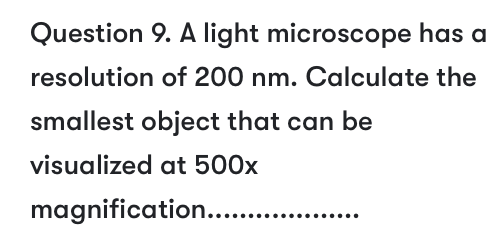A light microscope has a resolution of 200 nm. Calculate the smallest object that can be visualized at 500x magnification.

Understand the Problem
The question is asking us to calculate the smallest object that can be visualized with a light microscope given its resolution and magnification. To solve this, we will use the formula that relates resolution, magnification, and the size of the object.
Answer
The smallest object that can be visualized at 500x magnification is $0.4 \text{ nm}$.
Answer for screen readers
The smallest object that can be visualized at 500x magnification is $0.4 \text{ nm}$.
Steps to Solve
- Understanding Resolution and Magnification
The resolution of a microscope defines the smallest distance apart that two objects can be distinguished. In this case, the resolution is given as 200 nm. Magnification, here 500x, indicates how much larger the viewed object appears compared to its actual size.
- Using the Formula
The smallest object size that can be visualized is related to the resolution by the formula: $$ \text{Smallest object size} = \frac{\text{Resolution}}{\text{Magnification}} $$
- Plugging in Values
Substituting the values into the formula: $$ \text{Smallest object size} = \frac{200 \text{ nm}}{500} $$
- Calculating the Result
Now we will calculate the smallest object size: $$ \text{Smallest object size} = \frac{200}{500} = 0.4 \text{ nm} $$
- Final Result
Thus, the calculation gives us the smallest object that can be visualized at the given magnification.
The smallest object that can be visualized at 500x magnification is $0.4 \text{ nm}$.
More Information
This result indicates that under the given conditions, the microscope can visualize extremely small objects, much smaller than typical biological cells, which are generally in the range of micrometers.
Tips
- Confusing magnification with resolution: Remember that resolution specifies how close two points can be, while magnification simply enlarges the view.
- Forgetting to convert between units: Ensure that the units (nm, micrometers) are consistent if they come up.
AI-generated content may contain errors. Please verify critical information